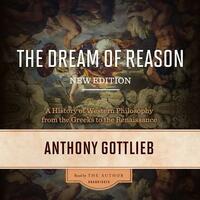Take a photo of a barcode or cover
26 reviews for:
The Dream of Reason, New Edition: A History of Western Philosophy from the Greeks to the Renaissance
26 reviews for:
The Dream of Reason, New Edition: A History of Western Philosophy from the Greeks to the Renaissance
informative
slow-paced
The Dream of Reason takes a human, popular view at philosophy from the ancient Greeks forward to the Renaissance, treating this conversation as one of wise, fallible, and occasionally funny humans through the ages. These were people grappling with Big Questions, namely what is the universe made of, how did it come to be, and how do people lead meaningful lives, and while their answers do not match modern understandings, they are foundational. For someone with a fairly weak background in philosophy, especially the older stuff, it's a good supplement to a missed classical education.
The first few chapters, on the pre-Socratics, are necessarily weaker, given that the surviving works of these authors is measured in a few hundred lines, and sometimes even a handful of direct words and a maze of quotations and commentaries. The book fully arrives with Socrates, who's method of systematic questioning set the form for much of what follows. Plato and Aristotle get detailed overviews as well, with their foundational works on ethics, metaphysics, as well as more practical topics like logic and biology.
What follows after the big three is less good. Gottlieb has less sympathy for the efforts of the stoics, epicureans, and skeptics to flesh out frameworks in the wake of Aristotle. Medieval theology, and the effort to synthesize non-heretical Christian theology with neoplatonist mysticism is mostly a dead end. One thing which I learned was that the scientific reaction against Aristotle was more rhetoric than reality. Aristotle couldn't have been the stifling authority on Western learning during the Middle Ages, because he was almost lost entirely, only being preserved by Arab philosophers (a sadly absent chapter). The abstruse commentary style of the scholastics has little in common with Aristotle, who can be tedious, but is generally a model of clarity. While Aristotle's physics lack the tools of quantified measurement which make modern physics work, he was a dedicated empiricist.
Fun and informative, and not exactly unbiased, The Dream of Reason is a solid introduction and overview.
The first few chapters, on the pre-Socratics, are necessarily weaker, given that the surviving works of these authors is measured in a few hundred lines, and sometimes even a handful of direct words and a maze of quotations and commentaries. The book fully arrives with Socrates, who's method of systematic questioning set the form for much of what follows. Plato and Aristotle get detailed overviews as well, with their foundational works on ethics, metaphysics, as well as more practical topics like logic and biology.
What follows after the big three is less good. Gottlieb has less sympathy for the efforts of the stoics, epicureans, and skeptics to flesh out frameworks in the wake of Aristotle. Medieval theology, and the effort to synthesize non-heretical Christian theology with neoplatonist mysticism is mostly a dead end. One thing which I learned was that the scientific reaction against Aristotle was more rhetoric than reality. Aristotle couldn't have been the stifling authority on Western learning during the Middle Ages, because he was almost lost entirely, only being preserved by Arab philosophers (a sadly absent chapter). The abstruse commentary style of the scholastics has little in common with Aristotle, who can be tedious, but is generally a model of clarity. While Aristotle's physics lack the tools of quantified measurement which make modern physics work, he was a dedicated empiricist.
Fun and informative, and not exactly unbiased, The Dream of Reason is a solid introduction and overview.
informative
reflective
medium-paced
This is comprehensive, but a digestible summary of western philosophy from an editor of the Economist magazine. This is first of a two part series and covers the period from the Greek Milesian school and ends with renaissance. This book, an attempt to distil and connect the work of major thinkers poses a slight problem. I cannot review this book for accuracy of how the philosophers are represented or even if all the important ones are covered, since that would presuppose that I already have comprehensive view of the subject and that is far from the case. I assume the selections and fair and represent the subjects well, based on reading other reviews in publications.
Going past that, Gottlieb has been able to draw a sweeping and effective picture of the history of western thought, with enough of the chosen thinkers to represent them uniquely enough while not spending too much on each that it becomes boring. The style befits an Economist editor – clear, without jargon, with a light touch and a gentle humour. This worked thankfully well to sustain interest on what could have been an otherwise boring subject, for me at least. As one would expect, the author spends more time on Socrates, Pluto and Aristotle compared to other thinkers. He does not attempt to cover all the works of the chosen thinkers, but a few, and draws threads that connect over time and thought remarkably. The author does not stray far from the subject of covering philosophical thought itself and hence there is very little discussion on the lives or the times.
The book is cheerfully dismissive early on the thinkers it covers, but is overall quite sympathetic towards it subjects, sometimes a tad too much. While the author has chosen to mention how some of thinkers were criticized later (for instance Epicurus and Aristotle) and how it is unfair. His main form of defence can be summarized as that the charges of the critics are too frivolous to be taken seriously. This is unconvincing and is the one quibble I have with the book, but a very feeble one.
Overall, this is a very educative book on philosophy, but still an enjoyable one - one that could serve to understand the views of many a little, before you choose to read more on any one area or thinker. I listened to this as an audiobook.
Going past that, Gottlieb has been able to draw a sweeping and effective picture of the history of western thought, with enough of the chosen thinkers to represent them uniquely enough while not spending too much on each that it becomes boring. The style befits an Economist editor – clear, without jargon, with a light touch and a gentle humour. This worked thankfully well to sustain interest on what could have been an otherwise boring subject, for me at least. As one would expect, the author spends more time on Socrates, Pluto and Aristotle compared to other thinkers. He does not attempt to cover all the works of the chosen thinkers, but a few, and draws threads that connect over time and thought remarkably. The author does not stray far from the subject of covering philosophical thought itself and hence there is very little discussion on the lives or the times.
The book is cheerfully dismissive early on the thinkers it covers, but is overall quite sympathetic towards it subjects, sometimes a tad too much. While the author has chosen to mention how some of thinkers were criticized later (for instance Epicurus and Aristotle) and how it is unfair. His main form of defence can be summarized as that the charges of the critics are too frivolous to be taken seriously. This is unconvincing and is the one quibble I have with the book, but a very feeble one.
Overall, this is a very educative book on philosophy, but still an enjoyable one - one that could serve to understand the views of many a little, before you choose to read more on any one area or thinker. I listened to this as an audiobook.
informative
slow-paced
Gottlieb provides an excellent review of early Western philosophy, beginning with the early Greeks up to the early modern period (which he delves into in his second excellent volume). For the most part, the sketches and descriptions are brief and provide something if an appetizer for more in-depth study. But Gottlieb's more thorough treatments of Socrates, Plato and Aristotle gave me more insight into those famous men than I'd read elsewhere.
Gottlieb's easy style, often poignant and occasionally humorous, is a joy to read. As a stepping-off point for anyone interested in the roots of Western philosophy, I can wholeheartedly recommend this superb volume.
Gottlieb's easy style, often poignant and occasionally humorous, is a joy to read. As a stepping-off point for anyone interested in the roots of Western philosophy, I can wholeheartedly recommend this superb volume.
A look at the writings of some great thinkers, from classical and pre-Socratic philosophers through the Renaissance intellectuals like Erasmus. This volume is highly readable to average thinkers like me. Gottlieb tells us a story we can understand and embrace, bringing those great thinker's ideas to my level. I appreciated it, and loved it. AND, I may well read it again.
informative
reflective
fast-paced
Crikey, that took a while!
This serves as a great introduction to western philosophy, but it is only that, an introduction. The tone is great; informative but still light and manages some genuine humour. Scholarly without feeling overly lecturing. I found myself often wanting to explore more details about the topics that were being discussed. But Gottlieb does a great job of not getting too bogged down in details and instead preferring to paint a wider picture of the trends philosophy took over several millenia. That said, there are varying levels of detail in the three sections of the book, which feels a little odd. The middle third on Socrates, Plato and Aristotle is by far the most fleshed out and dense section.
But I've learnt a lot, including new concepts, new ways of looking at old concepts and even the comprehension of truly alien worldviews, so I'd call this a big win.
Also, as you can see by the dates started/finished, I really struggled to read this much non-fiction. I would like to try some more because I am very keen on learning, but it was not exactly what I'd call relaxing or even always enjoyable, so I may stick to podcasts, audiobooks and videos for my learning needs. See, I'm not just learning about the world, I'm learning about myself too. The real philosophy is the friends we made along the way.
Would d
This serves as a great introduction to western philosophy, but it is only that, an introduction. The tone is great; informative but still light and manages some genuine humour. Scholarly without feeling overly lecturing. I found myself often wanting to explore more details about the topics that were being discussed. But Gottlieb does a great job of not getting too bogged down in details and instead preferring to paint a wider picture of the trends philosophy took over several millenia. That said, there are varying levels of detail in the three sections of the book, which feels a little odd. The middle third on Socrates, Plato and Aristotle is by far the most fleshed out and dense section.
But I've learnt a lot, including new concepts, new ways of looking at old concepts and even the comprehension of truly alien worldviews, so I'd call this a big win.
Also, as you can see by the dates started/finished, I really struggled to read this much non-fiction. I would like to try some more because I am very keen on learning, but it was not exactly what I'd call relaxing or even always enjoyable, so I may stick to podcasts, audiobooks and videos for my learning needs. See, I'm not just learning about the world, I'm learning about myself too. The real philosophy is the friends we made along the way.
Would d
Comprehensive but still very approachable, well-written overview of our universe of thought. A must read.




